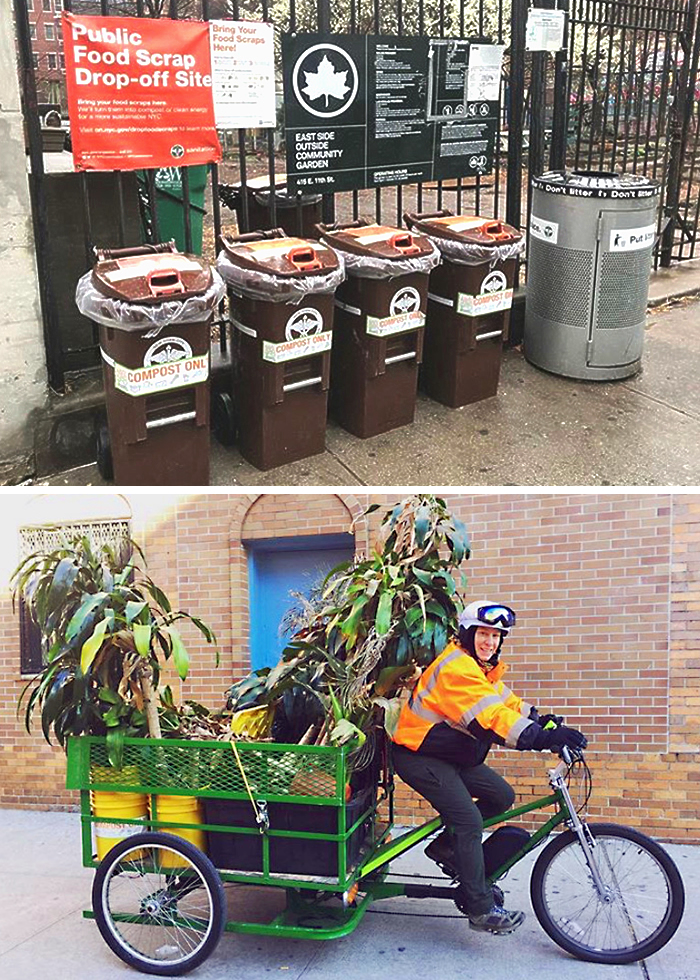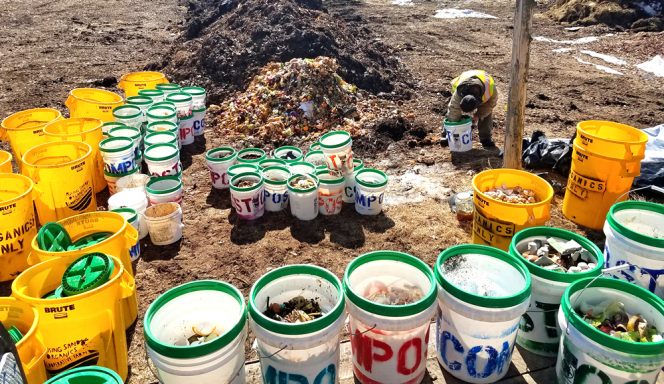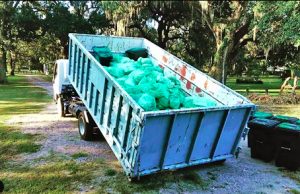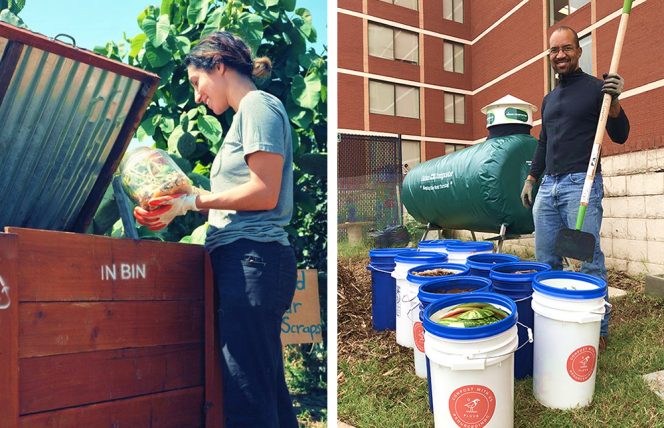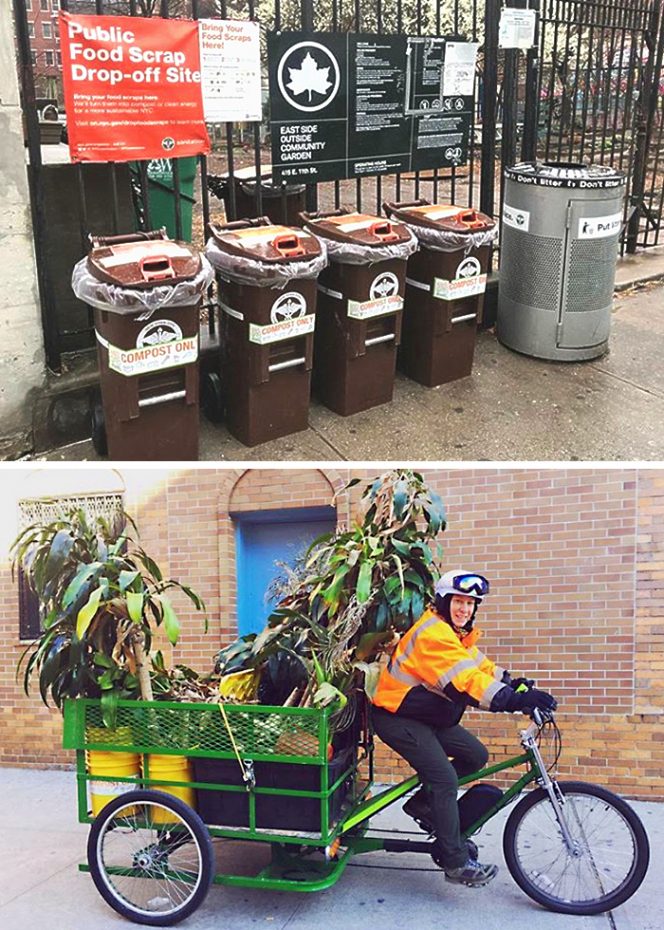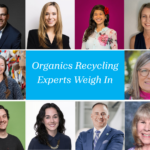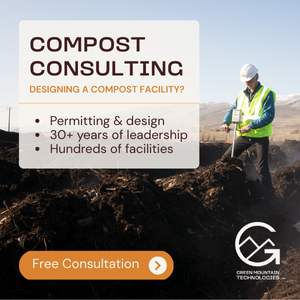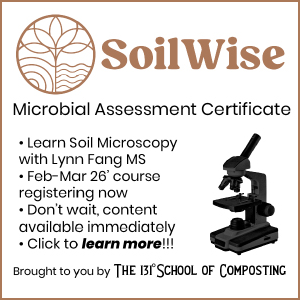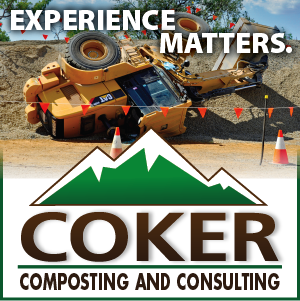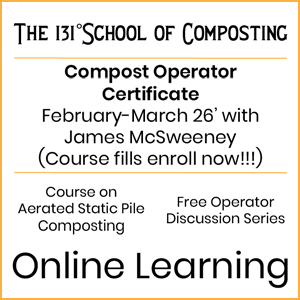Molly Lindsay
The second installment in this series, “Lessons in Community Composting,” covers business structure and focus. I spoke to five community composters from around the country to learn about their operations and find out how they got their start.
Determining focus generally starts for most by seeing a need in the community and wanting to provide a solution, whether that be collecting food scraps from residents and businesses, starting a zero waste events service, or training people to produce compost. It’s also dependent on the landscape of your area. Is there a saturation of haulers or processors? Will you have access to a location to compost or can you lease land? What are the restrictions in your area for composting or permits for hauling food scraps?
Kelly Adlington describes her enterprise, Rising Sands Organics, as “a farm first.” She started a food scrap collection service as a way to cut costs in the farming operation by producing compost. “Compost costs thousands of dollars for a farm of our size — a 35-acre property,” says Adlington. She and her coworkers began collecting residential and commercial organics in her community of Stevens Point, Wisconsin in 2017. The material is processed in partnership with another local farm and partially at Rising Sands, with the compost produced split between the two farms to grow food for themselves and the community.
Similarly, Nicola Krebill, founder of Schmelly’s Dirt Farm in New Orleans, also started a business to produce compost to “address New Orleans’ inadequate supply of fertile garden soil and compost needed to grow food,” and “create meaningful jobs that provided a solution to food waste through composting.” The core of the Dirt Farm’s business is commercial collection, which started in 2014 by servicing mostly small businesses. Within the last year, the company has grown to collecting from larger clients like hotels and event venues. Schmelly’s has been donating and selling its finished compost in bulk, and is in the process of developing a bagged product. “We love the full cycle aspect of how we collect compostable organic material from businesses, transport it to our farm, and create a product that farmers and gardeners can use to grow healthy plants without pesticides and chemical fertilizers,” notes Krebill.
Community engagement and teaching people how to compost is a goal of both LA Compost in California, and Loop Closing in Washington D.C. “It’s always been about connecting people to the soil and building community around compost,” says Lynn Fang, Operations Support at LA Compost. The organization has established Compost Hubs throughout Los Angeles, where participants can drop off their food scraps and get hands-on experience composting. They also offer drop spots at farmers’ markets. The compost produced at the Hubs is freely accessible for use by volunteers involved in the program.
In Washington D.C., Jeffrey Neal, founder of Loop Closing, was inspired to create a business that processed material on-site to eliminate the need for hauling organics, while also producing compost to regenerate soils. Loop Closing provides a solution for organizations by designing composting operations, installing in-vessel machines, and offering ongoing consultation and workforce development. “I initially worked with donation-funded and volunteer-operated community composting sites that provide tremendous educational opportunities, but small overall diversion rates for a city or region,” explains Neal. “We are now focused on developing systems with commercial and government food waste generators that have trained, paid staff, which provides the potential for higher diversion rates. We’ve maintained our community focus but are evolving from volunteers to workforce development training… providing underrepresented community members the opportunity to join this burgeoning economy of future-leaning green jobs and participate in the environmental justice field.”
Another business with a diverse model is Common Ground Compost based in New York City (NYC), which provides composting and recycling consulting services such as program design and management, employee training, eco-friendly product procurement, signage design, and more — as well as zero waste event services. Their program, Reclaimed Organics, collects food waste and compostable materials by bicycle from businesses like corporate offices; for residents, it offers a bokashi composting service. Common Ground Compost also facilitates a food scrap drop off at its community garden in the Lower East Side through NYC’s organics collection program (currently on pause due to COVID-19). “The goal of our business has never been to just be profitable, but to increase awareness and access to organics,” says Common Ground Compost’s director, Meredith Danberg-Ficarelli.
Structuring Options
How your business or organization is structured should support your overall mission and allow it to scale over time. For example, establishing a nonprofit can be beneficial if your primary focus is on education and community engagement. LA Compost is a nonprofit funded by local and global foundations. Most of its programs are offered at no cost; others operate on a donation basis to increase accessibility and encourage participation. Its partnerships throughout Los Angeles County have made it possible to expand the Composting Hubs, establishing them at locations like community gardens, schools, and churches.
Schmelly’s is a social enterprise with a L3C or Low-Profit Limited Liability Corporation — a hybrid of a LLC and a nonprofit. It operates to benefit the general public without shareholders and without a profit motive. “At the time of our incorporation, this seemed like the business structure that best fit the mission and values-driven nature of the company,” explains Krebill.
Rising Sands Organics is a worker-owned cooperative. While Adlington manages the composting operation, she says it’s a shared responsibility among the members. “The cooperative model has been essential for it to operate and for me to discover what I want to do for a career,” says Adlington. “It shows you how much worth you have, and I realized I have a lot more power. Working with your friends, having access to land, and learning how to be good stewards of the land have been the benefits of our model.”
While aspiring to be worker-owned, Loop Closing is currently a for-profit organization and LLC, as that was “the path of least resistance to get started,” notes Neal. He plans to transition to an Employee-Owned B Corp. “Organizations already spend so much on food waste removal, I believed there was a market for a better solution,” he adds. “This would also allow me to include worker development programs and partnering with nonprofits.”
Reacting and adapting to your community’s needs, your goals as a business or organization, and long-term feasibility are important pieces in establishing a community composting structure and focus. These should be heavily considered in formulating your plan and revisited regularly as you scale.
In the next installment of this series, I will dig deeper into how these organizations execute their operations and insights they’ve learned along the way.
Molly Lindsay is Director of Operations at the Community Compost Company, a food scrap collection service and compost production company headquartered in New Paltz, New York. She also serves as Editor of Livelihood magazine, a resource for good news on keeping money local, sharing abundance, and strengthening communities in the Hudson Valley.


